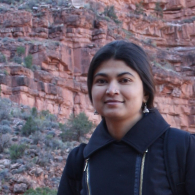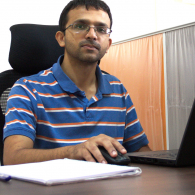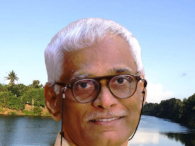Specializations
1. Astrophysics
One of the prime goals in astrophysics is to understand the origin and evolution of elements in our Galaxy starting from the Big Bang about 13.7 Gyr ago. The astrophysics research at IIT Palakkad is broadly focussed on theoretical and computational aspects of nuclear and neutrino astrophysics that tries to address this problem. This includes: stellar evolution and nucleosynthesis in massive stars; explosive and neutrino-induced nucleosynthesis during core-collapse supernovae; nucleosynthesis in binary neutron star and neutron star-black hole mergers; rapid (r), intermediate (i) and slow (s) neutron capture processes; early Galactic and chemical evolution and Galactic archaeology using metal-poor stars; Big Bang nucleosynthesis.
Faculty Members
-
Dr. Projjwal Banerjee
2. Condensed Matter Theory
Research in Theoretical Condensed Matter Physics at IIT Palakkad focuses on strongly correlated quantum spin liquid phases in quantum magnetic systems. These systems have novel topological phases and emergent fractional particle excitations. Understanding the nature of these topological phases, their excitations and phase transitions between them is the focus of our current work. We also study the effects of impurities and disorder in these systems. Moreover, we look into the topological systems that are relevant for quantum error correcting codes, such as Kitaev's surface code and the color code, and study their properties from the perspective of interacting quantum many-body systems, focussing in particular on the characterization of their phases using entanglement and other quantum correlations. We are currently working on understanding magnetic phases and quantum spin liquid phases in rare-earth pyrochlore lattice materials. We are also looking into the robustness of topological phases under external perturbations, such as magnetic field, environmental noise, and loss of spins.
Faculty Members
- Dr. Amit Kumar Pal
- Dr. Kusum Dhochak
3. Experimental Condensed Matter Physics
Research in experimental condensed matter physics at IIT Palakkad is focused on synthesis, fabrication and investigation of 2D materials and correlated electron materials. Research in 2D materials mainly focuses on studies on magneto transport, thermal conductivity in pristine as well as heterostructure of 2D materials. Moreover, hybrids and nano-composite of 2D materials with perovskites has also many potential applications and hence forms a major part of research work at IIT Palakkad.
Correlated electron materials are novel quantum materials where different quantum phases like frustrated magnetism, superconductivity, topologically non-trivial electronic states (e.g. topological insulator, Dirac and Weyl Semimetal) arise from electron-electron correlation. We study temperature (down to mK) and magnetic field dependent magnetic and electronic properties of these quantum materials. Single crystals (few millimeters in dimension) of different quantum materials (oxide, intermetallic etc.) are synthesized using different techniques like flux method, chemical vapor transport method. Structural investigation of synthesized single crystals and thin films are done using temperature dependent Rigaku x- ray diffractometer and Raman Spectrometer. For temperature dependent magneto- transport measurement an Oxford closed cycle cryostat with 12 Tesla superconducting magnet and temperature range of 300 mK – 400K is soon going to be inducted within CIF.
Faculty Members
- Dr. Jayakumar Balakrishnan
- Dr. Soham Manni
4. Quantum Information & Non equilibrium Physics
The research in quantum physics division of IIT Palakkad focuses mainly on the theoretical aspects of quantum information and computation, and the non-equilibrium dynamics of systems undergoing quantum phase transitions. In the former, we focus mainly on the detection, quantification, and characterization of quantum correlation measures, such as entanglement, that are used as resources in several quantum information processing tasks. We investigate the bipartite as well as multipartite quantum correlation measures belonging to entanglement-separability and information-theoretic paradigms, and investigate the behaviour of these measures in situations where the quantum system, for example, an interacting many-body system which is an ideal candidate for quantum information processing, is open to an environment. These studies are essential for understanding the trends of quantum correlations in the presence of noise -- a situation that is realistic from experimental perspective.
We are also interested in the non-equilibrium dynamics of systems, which can be induced by changing a system parameter suddenly, taking the system into some excited state. It can also be done by performing adiabatic dynamics (slow variation) such that the system crosses quantum critical point. This will lead to excitations in the system due to diverging relaxation time at the critical point. Interesting behavior and scaling relations are obtained during such non-equilibrium dynamics. At IIT Palakkad, we look at specific quantum information theoretic measures, for example, entanglement entropy, along with excitation density to quantify such non-equilibrium dynamics. Presently, we are also exploring the field of quantum thermodynamics to understand the workings of quantum heat engines.
Faculty Members
- Dr. Amit Kumar Pal
- Dr. Uma Divakaran
5. Soft Matter Physics
The soft-matter and Biophysics group at IIT-Palakkad is involved in understanding the physics of active systems, membranes and cells.
Using Monte Carlo simulation, Prof. Sunil Kumar and his group has recently investigated the lipid-protein interaction leading to conformational changes in the multi-component vesicle. In another simulation study they have shown that the tuning of adhesion strength of nano-particles on lipid membranes can give-rise to various self-assembled structures. His current research interest includes developing multi-scale models to decipher properties both at the molecular and macroscopic level of wide variety of systems.
Dr Bibhu Ranjan Sarangi’s research is focused on understanding the process of “cellular-mechanosensing” at various length scales. Combining micro Force sensing arrays(μFSA) with Foster-resonance energy transfer (FRET) techniques he has investigated the correlation of external forces with internal tension developed at the scale of a protein. In addition with the help of high resolution light-microscopy he has also studied the morphology of the Focal-adhesions, which could explain the inhomogeneous tension distribution inside the focal adhesion. His current research aims to understand the mechanical aspects of cells and tissues in relation to the progression of cancer.
Using simulation methods, Dr. Vishwas study the evolution of metastable materials (eg., supercooled liquid) and out-of-equilibrium systems (eg., amorphous solid) under thermal fluctuations and/or mechanical perturbations. The focus of the work pivot around a) Understanding the relaxation and fluidisation mechanism to explore the analogy between the thermal noise and the mechanical noise and b) Apply these understandings to design and control material properties.
Faculty Members
- Prof. P. B. Sunil Kumar
- Dr. Bibhu Ranjan Sarangi
- Dr. Vishwas V.
6. Theoretical High Energy Physics
The research in Theoretical High Energy Physics at Palakkad focusses on Quantum Field Theory and AdS/CFT correspondence. In particular the focus is on strongly coupled field theories and the various approaches to understand it. Recently we are working on Sachdev Ye Kitaev models which is a 1d quantum mechanical model which is exactly solvable in certain limits and show interesting connections to gravity and hence to string theory. The hope is that these studies will lead to a deeper understanding of the AdS/CFT duality.
Faculty Members
- Dr. Prithvi Narayan P.
Research Facilities
Laboratories / Research Centers
- Physics Lab
Research Equipments
















